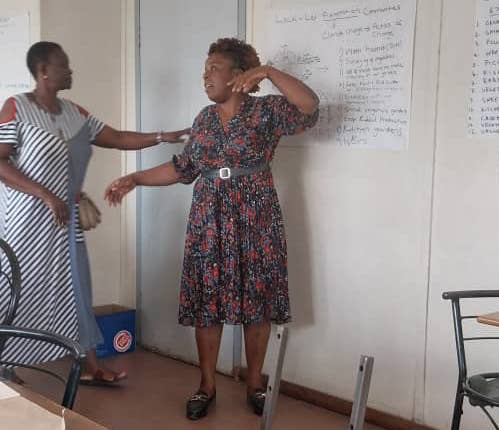|
Getting your Trinity Audio player ready...
|
The Zimbabwe Parents of Handicapped Children Association (ZPHCA), through working closely with grassroots women, is taking a leading role in building back their families and communities affected by climate change in Zimbabwe.
On the 25th of March 2024, 24 grassroots women affected by climate change gathered in Harare for a Reflection, Planning, and Consultative Forum in the wake of another Cyclone El Nino-induced drought and failed harvest.
The Climate Change Resilience Building Planning and Consultative Forum was convened by the Zimbabwe Parents of Handicapped Children’s Association (ZPHCA) in partnership with Huairou Commission.
The grassroots women came from various neighbourhoods of Harare, Chitungwiza, Epworth, Domboshawa, Caledonia, Concession, Dema Rural, and Eastview amongst other communities.
“One thing in common that brought these grassroots women together is the fact that they have all been affected by climate change and its related challenges and impacts. The 24 grassroots women are all leaders and were representing their various resilience-building livelihoods projects groups undertaking various projects such as organic gardening, poultry, rabbit keeping, kitchen gardening, peanut butter making, fruit gardening, and goat production amongst others,” said Theresa Makwara, the ZPHCA National Coordinator.
The grassroots women representation was a fusion of experienced and knowledgeable grassroots women as some participants have more than 5 years of experience implementing climate change resilience building livelihoods projects while other grassroots women representatives were from newly formed groups and are still learning how to navigate building resilience to climate change and building back better livelihoods of their families and communities affected by Climate Change.
The experienced groups were sharing their practical experiences implementing ZPHCA and Huairou Commission-supported resilience building and adaptation projects while new groups were bringing new ideas, new insights, and new ways of combating climate change.
The grassroots women resilience building members reaffirmed their commitment to accepting the community leadership challenge in as much as finding the lasting solution to poverty, food insecurity, and income insecurity challenges being experienced by women, families, and communities in the wake of Climate Change and other disasters.
The grassroots women leaders reaffirmed the need to continuously engage and dialogue with traditional leaders, local leaders, and local authorities in their quest to secure land, water, and other natural resources which are the primary requirements for launching successful and sustainable resilience-building livelihoods projects.
Grassroots women made a clarion call for stakeholders to recognise, support, and safeguard the gains grassroots women have made in building back families and communities devasted by Climate Change, Covid-19, and cholera disasters. Grassroots women identified the need for more information on early warning systems, market gardening, local and international markets information, and value addition technologies as they move towards transforming their various livelihood projects into fully fletched Agri-businesses.
The newly formed groups were encouraged to harness their collective labour, skills, and energies towards the smooth running of their various resilience-building livelihood projects while staying true to accountability and transparency systems for the sustainability and continuity of their group projects.
Participants encouraged each other to diversify their livelihood projects, diversify their food sources, embrace organic farming, and ensure that their activities are environmentally friendly.
The Planning and Consultative Forum ended amidst grassroots women leaders applauding their strategic partnership with the Media, Government Departments, and Local Leadership.
As such, health partnerships and networking relationships were motivating more grassroots women and communities to replicate the resilience-building livelihood projects being undertaken by grassroots women for the benefit of their families and communities in terms of food and income security.






